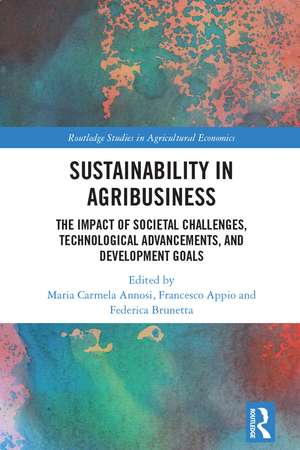Sustainability in Agribusiness: The Impact of Societal Challenges, Technological Advancements, and Development Goals: Routledge Studies in Agricultural Economics
Autor Francesco Appio, Federica Brunetta, Maria Carmela Annosien Limba Engleză Paperback – 30 dec 2022
Preț: 280.51 lei
Nou
53.69€ • 58.34$ • 45.13£
Carte disponibilă
Livrare economică 31 martie-14 aprilie
Livrare express 14-20 martie pentru 29.83 lei
Specificații
ISBN-10: 1032122277
Pagini: 196
Ilustrații: 13 Tables, black and white; 17 Line drawings, black and white; 7 Halftones, black and white; 24 Illustrations, black and white
Dimensiuni: 156 x 234 x 15 mm
Greutate: 0.38 kg
Ediția:1
Editura: Taylor & Francis
Colecția Routledge
Seria Routledge Studies in Agricultural Economics
Locul publicării:Oxford, United Kingdom
Public țintă
PostgraduateCuprins
Introduction, PART 1 THEORIES, CONCEPTS, AND DEFINITIONS, Chapter 1 State of the art and conceptual issues: Agribusiness and Sustainability, Chapter 2 The role of agribusiness in achieving Sustainable Development Goals: technologies, strategies, and ecosystems, Chapter 3 Gender Equality in Sustainability Reporting: Insights from Listed Italian Agri-Food Companies, PART II THE ROLE OF BUSINESS MODELS AND ECOSYSTEMS, Chapter 4 Inclusive value creation in the coffee industry A Framework of Blockchain-Enabled Dynamic Capabilities for Sustainable International Supply Chain Transformation, Chapter 5 Associativism as a promoter of sustainability in farmers and a driver for creating value for sustainable practices: the case of Socicana, Chapter 6 Social business models in agri-food: An interview with Sara Rajabli, founder of Buta Art & Sweets, PART III THE ROLE OF INNOVATIVE TECHNOLOGIES FOR SUSTAINABILITY, Chapter 7 The role of innovative technologies for sustainability, Conclusion Sustainability in agribusiness: what is still in the works
Notă biografică
Maria Carmela Annosi is Senior Assistant Professor of Innovation Management and Organizational Behavior at the School of Social Sciences, Wageningen University and Research, The Netherlands. She is a member of the Research Centre in Business Transformation (ReBoot), LUISS Business School. She is co-founder of DigiMetis network of WUR research experts on the analysis of socio-ecological systems in a digitalized era, inside Wageningen University and Research and she is an academic external collaborator of McGill Centre for the Convergence of Health and Economics (MCCHE). She is a Board Member of the International Food and Agribusiness Management Association (IFAMA).
Francesco Paolo Appio is Associate Professor of Innovation at SKEMA Business School (Campus Grand Paris, France) and Executive Committee member of the SKEMA AI Institute. He received a PhD in Management at Scuola Superiore Sant¿Anna (Italy) and visited important international institutions such as MIT Sloan, Bocconi University, and KU Leuven, among others.
Federica Brunetta is Associate Professor of Management and Strategy at the Luiss Business School and at the Department of Business and Management of Luiss University, in Rome. She is Vice Director of the Research Center for Business Transformation (ReBooT) and Academic Coordinator of Luiss Business School Executive Education.
Descriere
Accomplishing sustainability in the agribusiness sector is a significant, yet time-sensitive, challenge, especially when balanced with the need to grow sufficient quantity and quality of food to keep the growing global population healthy. Through both quantitative and qualitative methods, this book explores the extent to which the agribusiness sector is already evolving to become sustainable and the ways in which innovation in the industry can help address sustainable development goals, particularly around zero hunger, gender equality, decent work, responsible consumption and production, and climate action. The contributors to this volume address the following key questions: What are the drivers and barriers for the agribusiness sector to become sustainable? Which business models best facilitate the implementation of sustainable goals? How can we measure the extent to which the agribusiness sector is becoming more sustainable? How can the agribusiness sector leverage recent technological advancements to achieve its sustainability goals? The analysis of the sustainability challenges for the sector ranges across various facets of the industry including employment, pre-production industries, agriculture, food processing, distribution, and trade.
This book will be of significant interest to readers in agribusiness, innovation management, and sustainability.





